Daimler strengthens localization in China
( China Daily )
Increased investment in production, R&D, mobility solutions, bolsters core business, positions premium carmaker for future growth
The Chinese car market has become increasingly mature in recent years, and 2018 saw an overall decline. However, the premium car market continued to show momentum, and several new players have come on the scene to compete with long established automakers, which is certain to mean intense competition this year.
Among these long-established firms is German automaker Daimler. For the fourth consecutive year, China proved to be the largest single market for the company's Mercedes-Benz Cars business in 2018, with 674,125 new vehicles delivered, representing more than a quarter of the company's global sales figure of more than 2.4 million units.
With the continued "Made in China, for China" commitment of the local team, Mercedes-Benz achieved another sales record in 2018.
"We increased investment into production, R&D and mobility solutions, helping us continue to strengthen our core business, while actively paving the way for future development," said Hubertus Troska, the member of the board of management of Daimler AG responsible for China.
Electric mobility is one of the pillars of Daimler's strategy. This stands true with the immediate localization of the first Mercedes-Benz battery-electric model. Starting this year, the EQC SUV will be locally produced, using Chinese battery cells.
Under the EQ brand, Chinese customers will be provided with a comprehensive electric mobility ecosystem and offered a seamless customer experience.
Daimler's efforts in electric mobility form part of the company's CASE strategy, which consists of four pillars: connected, autonomous, shared and service and electric drive.
With this strategy, the company plans to expand beyond the scope of simply being an automaker to a company that offers its customers intuitive mobility.
To this end, Daimler Mobility Services announced in October 2018 its intent to form a joint venture with Geely Group Company for premium ride-hailing mobility services in several Chinese cities in 2019.
Thus, Daimler will complement its mobility services footprint in China, along with the car-sharing service car2go expanding its operation cities.
To continue investing in new trends and to further deepen its foothold in the country, Daimler has laid a solid foundation with its core business in local R&D, in addition to the production and sales of passenger cars.
The automaker's double-digit sales growth in China can be attributed to its strong portfolio of localized models.
The recently launched A-Class L sedan is customized for the needs of Chinese consumers with an elongated wheelbase and the tailored Mercedes-Benz User Experience infotainment system. This model is produced exclusive for the Chinese market at the Beijing Benz Automotive Co Ltd, or BBAC, the joint venture between Daimler and its long-term partner BAIC Group.
Preparations are also in place to operate a second BBAC production location, in addition to its local production hub in Yizhuang Industrial Park in Beijing, ignited by an investment of 11.9 billion yuan ($1.77 billion).
Meanwhile, to further accelerate the localization of new Mercedes-Benz models to meet market demand, 1.1 billion yuan is being invested in the establishment of Daimler's second major R&D site in Beijing.
The Daimler R&D Tech Center China is scheduled to start operations in 2020.
"We remain positive for further growth opportunities in China, our largest market, and will continue with our investment here," Troska said. "With strong local partners, we will continue to strive for products and services that aim to best fit the needs of our customers in China. This is where the youngest customer base for Mercedes-Benz passenger cars is located, with high expectations, while being open to innovative technologies."
Daimler also sees further potential in China as the largest market for commercial vehicles worldwide, where increasing e-commerce and infrastructure development bring greater opportunities.
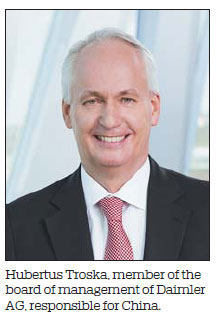
By the end of 2018, more than 580,000 Auman Trucks - medium and heavy-duty trucks produced at the joint venture Beijing Foton Daimler Automotive Co Ltd, or BFDA - had been sold in China since its establishment.
Besides partnerships with fellow automakers, Daimler is currently working with a number of educational institutions and internet corporations.
Plans are in place to make advances in automated driving, utilizing Baidu's Apollo platform and working with Tsinghua on sustainable transportation research in China.
Moreover, to further benefit the local community, Daimler continues to invest in local talent.
To this end, the company's vocational training program in China has continuously developed since 2006 to now include cooperation with 30 vocational schools across the country. Since its beginning more than a decade ago, the program has benefited a total of 6,000 students.
Featuring a dual training system, courses are combined with practical experience at Daimler joint venture production plants or the after-sales departments of Mercedes-Benz dealer partners.
Furthermore, a vocational training scholarship is offered for both students and teachers. And this is only one of a wide range of corporate social responsibility programs in China, through the Mercedes-Benz Star Fund, making contributions to Chinese society.
lifusheng@chinadaily.com.cn
|
The first locally produced Mercedes-Benz electric model, the EQC SUV, will roll off the line in 2019. Photos provided to China Daily |
|
Daimler will accelerate the localization of new Mercedes-Benz products with the investment in a new R&D Tech Center China. Shown here is the rendering of the Daimler R&D Tech Center China. |
(China Daily 01/30/2019 page15)
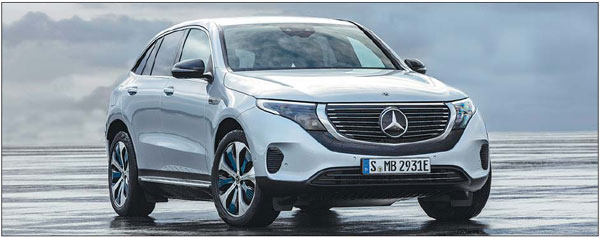
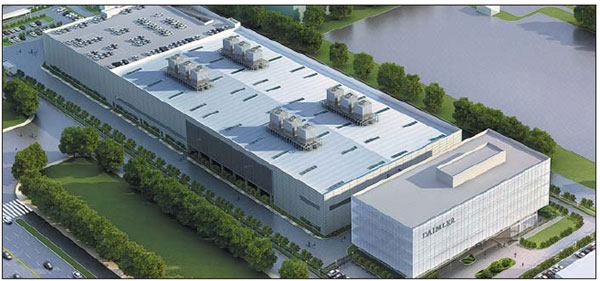
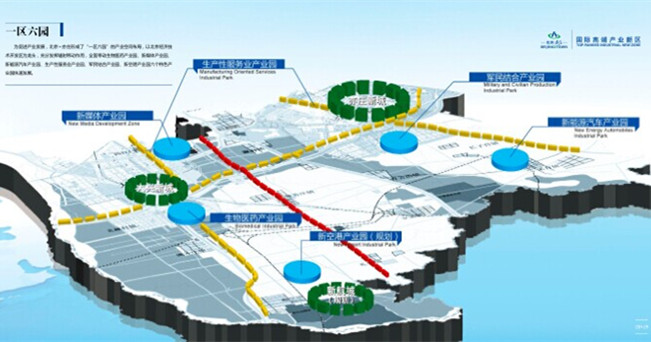 The Area with Six Parks
The Area with Six Parks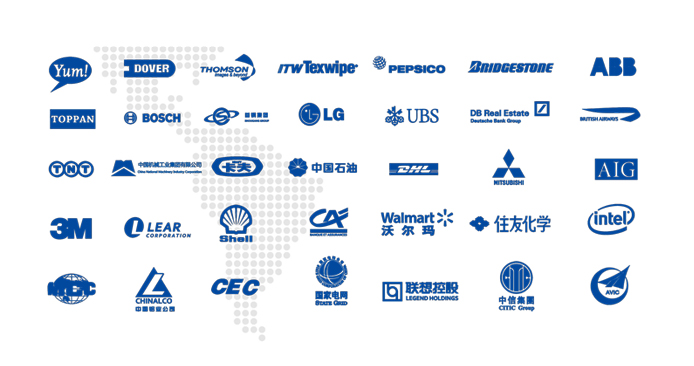 Global Top 500
Global Top 500